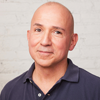
What’s been the most unexpected experience or encounter you’ve had in your journey with HIV?
That was the question we asked our followers on Facebook, Instagram, and Twitter. They served up some honest feelings and experiences
“I was diagnosed in January of ’92. I was 32 years old, and had never met a gay person, but it was the gay community in my 12 Step groups that guided me, supported me, sat on the phone for hours listening to me cry because I refused to burden my children with more of my issues. They were the ones who showed me which doctors were best, who got me a job—the list goes on and on. I grew up in a Baptist home, and although I had always questioned the misogyny and why we only send ‘thoughts and prayers’ to folks in need instead of actually doing something, homosexuality was never talked about out loud—hell, we never discussed any real life issues—so, the fact that the heterosexual community exiled me put many things into perspective.”
—Rose McCloud
“The most unexpected thing I have encountered thus far on my 25-plus year journey with HIV, is simply that it is okay to be living with HIV. Living with HIV has provided me with courage and strength to advocate for and help others living with HIV. I have become a better version of myself because of my long journey with HIV. All of this has been extraordinary, because I never thought I would be a long-term survivor. Simply, it is okay for me to be living with HIV, an unexpected gift that has enabled me to dream, to live, and to embrace love!”
—Jasan M. Ward
“Becoming ‘accidental advocates’ in the community has been the biggest unexpected thing that has happened in our 36 years of marriage and on our 14-year journey following our HIV diagnosis. As a couple, we were really laid back and quiet. After our diagnosis we fought to survive in a community where we didn’t see many people like us, we were actually accepted by the gay community. So, we stepped out to create a space where we could reach out to those in need to make a difference. The promise we made to each other after our diagnoses was to reach out and pull others up who need a hand. We developed a stronger bond between us as we worked together in the HIV community.
—Eunice and Kalvin Marshall
“The most unexpected part of my HIV diagnosis and living with HIV for nearly half my life now is the strength it’s given me. Though it hasn’t been easy, overcoming what was a death sentence can be very empowering.
— Jeffery Parks
“The ignorance of trained medical professionals. In 2000, I was pregnant, and was advised to consider termination by my OB. My daughter is HV negative, healthy and beautiful! In 2010, I told a dentist hygienist I had HIV, and she returned to do my dental cleaning in a full hazmat suit. The office didn’t routinely wear face shields. I “schooled” their office manager. In 2019, the podiatrist doing my foot surgery informed me he would alert OR staff I had HIV so they could take extra precautions. I countered that all medical professionals are supposed to take universal precautions. Other than people specialized in HIV care, the ignorance in the medical field is astounding even 27 years into my HIV journey!”
—Xio Mora-Lopez
“For me, it’s been unpacking internalized HIV stigma. One would think that living my life openly about being HIV positive, that this wouldn’t be an issue, but I find it popping up at the oddest of times and situations. I’ve also had a hard time with AIDS organizations and community-based organizations that say “we need more involvement of people living with HIV,” but when we do get involved and push back on fear mongering messaging, or that services aren’t equitable, that we are labeled as problematic and told that’s not the kind of involvement they wanted.
—Brady Dale Etzkorn-Morris
“For me, it has been the unwillingness of myself to be myself. Also, the constant struggle with the local AIDS service organization; in one breath they say that they want input from people living with HIV and from long-term survivors, but in the next breath, they seem to say they only want want to hear what they want to hear. There are a few “powers that be” at the local ASO that talk to talk; they don’t listen. They tell us what we need, instead of listening to what we need or want.
—Mark L Grantham


